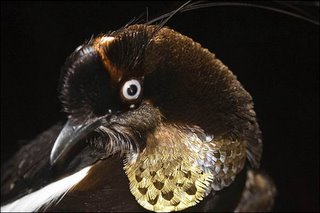
I have no faith in human perfectability. I think that human exertion will have no appreciable effect upon humanity. Man is now only more active - not more happy - nor more wise, than he was 6000 years ago.
Edgar Allan Poe (1809-1849)
Where there is perfection there is no story to tell. ~Ben Okri

 Vice President Dick Cheney went pheasant shooting in Pennsylvania in December 2003, but unlike most of his fellow hunters across America, he didn't have to spend hours or even days tramping the fields and hedgerows in hopes of bagging a brace of birds for the dinner table.
Vice President Dick Cheney went pheasant shooting in Pennsylvania in December 2003, but unlike most of his fellow hunters across America, he didn't have to spend hours or even days tramping the fields and hedgerows in hopes of bagging a brace of birds for the dinner table.
 The team gathered the first photographic record of the Berlepsch's six-wired "lost" bird of paradise (Image: Bruce Beehler)
The team gathered the first photographic record of the Berlepsch's six-wired "lost" bird of paradise (Image: Bruce Beehler) First described in the late 19th century through specimens collected by indigenous hunters from an unknown location on New Guinea, the species had been the focus of several subsequent expeditions that failed to find it.
First described in the late 19th century through specimens collected by indigenous hunters from an unknown location on New Guinea, the species had been the focus of several subsequent expeditions that failed to find it.
On only the second day of the team's expedition, the amazed scientists watched as a male Berlepsch's bird of paradise performed a mating dance for an attending female in the field camp.
It was the first time a live male of the species had been observed by Western scientists, and proved that the Foja Mountains was the species' true home.
"This bird had been filed away and forgotten; it had been lost. To rediscover it was, for me, in some ways, more exciting than finding the honeyeater. I spent 20 years working on birds of paradise; they're pretty darn sexy beasts," Dr Beehler enthused.
The team also recorded a golden-mantled tree kangaroo, which was previously thought to have been hunted to near-extinction.
Some of the creatures the scientists came into contact with were remarkably unafraid of humans. Long-beaked echidnas, primitive egg-laying mammals, were happy to be picked up. (Image: Stephen Richards)
from a BBC News article